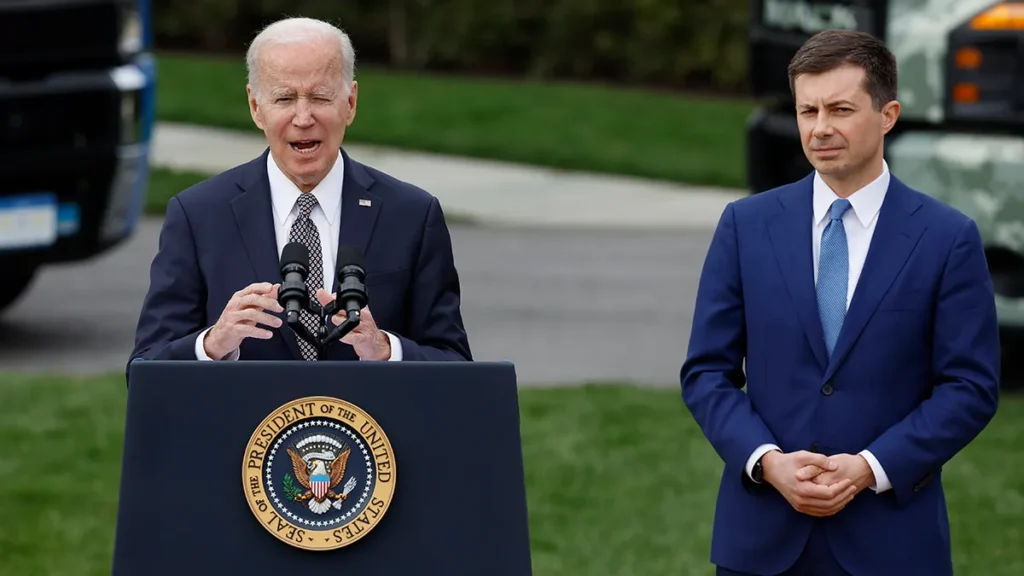President Joe Biden and Secretary of Transportation Pete Buttigieg had pledged to build 500,000 electric vehicle charging stations across the United States by 2030. However, as they prepare to leave office, only 8 operational charging stations have been completed, despite the allocation of $7.5 billion for the project. The Bipartisan Infrastructure Law, signed by Biden in November 2021, set aside $7.5 billion for electric vehicle charging, with $5 billion earmarked specifically for creating a network of chargers along major highways through the National Electric Vehicle Infrastructure program, the Post Millennial reported. But just eight EV charging stations are currently operational across four states.
During an interview earlier this year with CBS News’ Face the Nation host Margaret Brennan, Buttigieg was asked, “The Federal Highway Administration says only seven or eight charging stations have been produced with a $7.5 billion investment that taxpayers made back in 2021. Why isn’t that happening more quickly?” Buttigieg replied, “So the President’s goal is to have half a million chargers up by the end of this decade. Now, in order to do a charger, it’s more than just plunking a small device into the ground. There’s utility work. And this is also really a new category of federal investment. But we’ve been working with each of the 50 states. Every one of them is getting … dollars to do this work… Again, by 2030, 500,000 chargers and the very first handful of chargers are now already being physically built.”
REPORT: The Biden administration invested $7.5 billion into EV charging & produced just *8* charging stations over 4 years.
The Department of Transportation led by Pete Buttigieg is being mocked for the massive failure.
For comparison, a Tesla Supercharger costs less than… pic.twitter.com/G4MM7W6rkl
— Collin Rugg (@CollinRugg) November 24, 2024
At the time, the Federal Highway Administration reported that only seven operational charging stations with 38 charging spots existed. However, an analysis by Atlas Public Policy revealed that the allocated funding should have been enough to cover the construction of 20,000 charging spots, or roughly 5,000 stations. The only operational stations are located in Hawaii, New York, Ohio, and Pennsylvania, with additional stations under construction in four other states. While twelve states have received construction contracts, seventeen states have yet to submit proposals for the project.
Biden’s administration has been pushing electric vehicles in the country since shortly after they took office, and the president himself has regularly touted attempts to ‘move beyond’ the internal combustion engine, but a growing majority of automobile dealerships gave him a big dose of bad news in May.
According to a survey conducted by CDK Global, a research firm focusing on dealership data, 65% of dealership managers and executives expressed pessimism about the future of electric vehicles (EVs). Among the 250 respondents, 29% reported feeling very pessimistic about EVs. Additionally, one-third of respondents stated that their customers showed little interest in EV technology, Just the News reported.
According to the survey results, 25% of the respondents stated that their dealership sells less than 50 electric vehicles (EVs) per month. Meanwhile, 33% of them sell between 51 and 100 EVs, and 29% sell between 101 and 250 EVs per month. Additionally, 13% of the respondents reported selling more than 251 EVs per month. Only 13% of dealers expressed confidence in automotive manufacturers’ plans.
“Those numbers are troubling on the surface but when you consider the brands our respondents represent, it might be even more distressing,” the report stated, which said the respondents sell brands with the most EVs in their lineups or have well-regarded EV lines. “These are dealers with experience in volume and quality EVs. Yet, they’re still pessimistic,” the report added.
The survey revealed varying perspectives on the timeline for electric vehicle (EV) adoption among dealership managers and executives across different regions of the U.S. Only about half of the respondents believed that EVs would constitute half of all sales within the next 5-15 years, with differences noted among regions. In the South, 36% of respondents held this view, while in the East, 52% agreed with the projected timeframe. Additionally, a quarter of respondents expressed skepticism, suggesting that widespread EV adoption might not occur for several decades.
According to those surveyed, 62% of customers are passing on EVs because of the limited range, 47% of customers mentioned charging too difficult or takes too long, and 34% were concerned about the high purchase price. Last November, over 4,000 dealerships signed onto a letter telling Biden to put a halt on EV mandates, calling them “unrealistic.” Since then, 1,000 more have signed up for the campaign.



